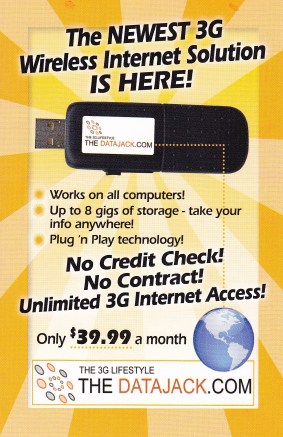
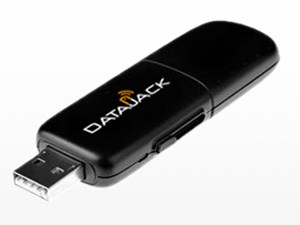
DataJack's dongle, sold for $99
Imagine truly unlimited 3G wireless broadband for $39.99 a month with no contract, no usage cap, no credit check, and no throttled speeds, all delivered from a small USB dongle that can connect to any netbook, laptop, or home computer. That’s the premise behind DataJack, a new product from Dallas-based QuamTel, Inc.
“3G provides high speed Internet service at average download speeds of 700kbps to 1.4 Mbps. That’s 2.4 times faster than many DSL connections,” trumpets DataJack’s web page.
Customers can purchase DataJack in a handful of retail stores or purchase directly from the company for $99, which covers the cost of the dongle. Monthly service fees are deducted from the customer’s credit card, and they can use the service as often as they like, and cancel at any time. If you use the service for 12 months in a row, you’ll get a free month of service.
Sounds like a deal, right?
Stop the Cap! always appreciates providers who don’t limit customer use of their products, so our initial plan was to inform readers about a possible alternative to the ubiquitous $60 for 5GB wireless broadband plans on offer from the major U.S. providers. But just because a product sounds good doesn’t mean it actually is good, so we thought taking a closer look would be appropriate, and we were glad we did. You will be, too.
The promise for unlimited 3G wireless broadband sounds exciting, but unfortunately the promise goes unfulfilled for too many who have tried the service.
DataJack doesn’t own their own wireless network. They contract with Wyless, which resells access to other companies’ wireless networks. DataJack launched service relying on T-Mobile’s 3G wireless network, which offers service in many major U.S. cities, but by no means offer comprehensive coverage across the country. Where 3G access is not available, DataJack falls back on older GPRS or EDGE connectivity, which offers far slower connections.
Earlier this month, DataJack’s website showed a coverage map that mirrored that of T-Mobile, which gave away the identity of who was supplying connectivity to the company. Potential customers could also enter their zip code on DataJack’s website and learn if coverage was available in their area. They could also write DataJack customer service, and a representative would send back additional information, including the percentage of customers who had fair, good, or great 3G coverage in that zip code.
Dear Valued Customer,
Thank you for your inquiry. Your coverage details are below:
Zip Code: 370XX
Zip Code Name: LEXXXXXXX
T-Mobile 3G Coverage Available Here.
Great Coverage: 37%
Good Coverage: 64%
Fair Coverage: 72%
This means that 72% of your area will have 3G connection, while 27% of your area will have the strongest signal with the fastest speeds. All 3G service area will connect to a high speed connection however, so you will still be able to upload and download at a high speed. If you have any additional questions, please feel free to either respond to this email or give customer service a call at 1-888-693-4522. We appreciate your interest in our product.
Regards,
Josh Kessell
DataJack Support
Several customers considering the service discovered a far better indication of what kind of service they could expect to receive could be found on T-Mobile’s own website, where its 3G coverage map could be zoomed in to street level.
Early adopters of new products are often the first to uncover problems, and it turns out there were plenty with DataJack.
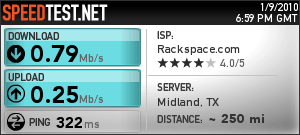
A Texas customer's speedtest results when using DataJack
First, despite company claims of “coverage” on the DataJack website, that doesn’t necessarily mean 3G coverage. Much like the spat between AT&T and Verizon Wireless over the size and scope of their 3G networks, DataJack considers the much slower GPRS and EDGE networks to represent “coverage” even though their marketing materials heavily promote the product as delivering 3G service (and corresponding speeds). Customers across the country were told by the website, as well as company representatives, that 3G service was available in their respective areas, but customers soon discovered that wasn’t true.
A customer in middle Tennessee on Howard Forums wasn’t impressed.
“Thumbs down for DataJack in Middle Tennessee. I received my device today and only connected to the GPRS network with 44kpbs downloads. I drove in a 45 mile radius, and this never changed,” he writes. “DataJack insisted there was 3G coverage here, in fact stating that 72% of my zip code was covered. Clearly 44kpbs is barely dialup, and not acceptable! The T-Mobile coverage maps tell the true story. If you’re not in a dark maroon/purple coverage area, don’t expect any speeds above GPRS/EDGE.”
Another customer in Paragon, Indiana reports he was told by a company representative 3G service was available in his area, but quickly learned that wasn’t true.
“I got the modem in the mail this morning, hooked it up and it got stuck searching for a network. I checked the T-Mobile coverage area and it shows no coverage at all in my area,” Danny writes.
In fact, T-Mobile offers no data coverage of any kind in that part of Indiana. Danny returned DataJack for a refund.
Second, promised speeds don’t come close to actual real-world experience with DataJack.
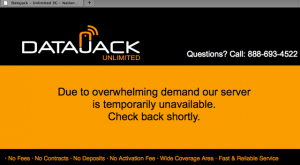 A customer in Orlando shares his story:
A customer in Orlando shares his story:
I can understand how this can be unlimited service. It’s not much better than dial-up so you won’t use a great deal of bandwidth downloading data. The manufacturer boasts upload speeds up to 5.76Mbps and download speeds of up to 7.2Mbps. Maybe that’s true, if you’re sitting under the tower but not in real life.
[After purchasing DataJack] I was ready to scream across the Internet and the blazing speeds they advertise … NOT! I was able to hit the high 400’s (kbps) for my download and the low 200’s for upload and I was hooked up to EDGE (not 3G), adequate for e-mail as long as there were no attachments. What a disappointment! Results from home were a little better but not impressive.
Bottom line, don’t expect a lot from DataJack. It does give you the freedom of mobility without signing a contract but you need to decide whether it’s worth the $40 or is it worth another $20 to $30 for more bandwidth and better performance.
Many others report underwhelming speeds when using DataJack, although a few in major urban areas did achieve speeds closer to the 1Mbps level promoted as available by DataJack’s marketing material.
Their website has been undergoing some transformation since we first learned of DataJack from regular Stop the Cap! reader Kirk. Two weeks ago, the site included a coverage map, which made it simple to identify T-Mobile as the provider of connectivity. That map is now gone.
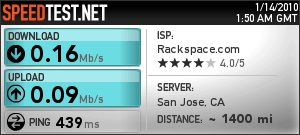
Speed test results for the California Delta region
In fact, the entire website has been gone for more than 24 hours now, first displaying a message claiming “overwhelming demand” brought down their server, which seems unlikely. As of last evening, the site was down completely, generating “page not found” errors.
Whether these problems represent growing pains or marketing promises that don’t match reality remains uncertain at this point. Relying exclusively on T-Mobile’s limited 3G network seems unwise for a product being marketed nationwide. It’s unclear why DataJack doesn’t leverage the network agreements Wyless maintains with multiple domestic providers:
- Cincinnati Bell Wireless
- Cingular AT&T (east/west/genesis)
- Sprint Nextel
- T-Mobile
If Wyless could sell access on Cingular/AT&T’s network to DataJack, it would help fill some of the coverage gaps. Sprint/Nextel doesn’t provide GSM network service, currently required by DataJack’s dongle.
It may be wise to wait for some of these issues to be worked out before investing $99 in a product that may not provide a reasonable wireless broadband experience in many areas. Perhaps these early problems can be resolved and improved speeds can be delivered. The company maintains a 14-day return policy if you want to give DataJack a try in your area.
[flv width=”474″ height=”340″]http://www.phillipdampier.com/video/DataJack Ad CES 1-2010.flv[/flv]



 Subscribe
Subscribe








